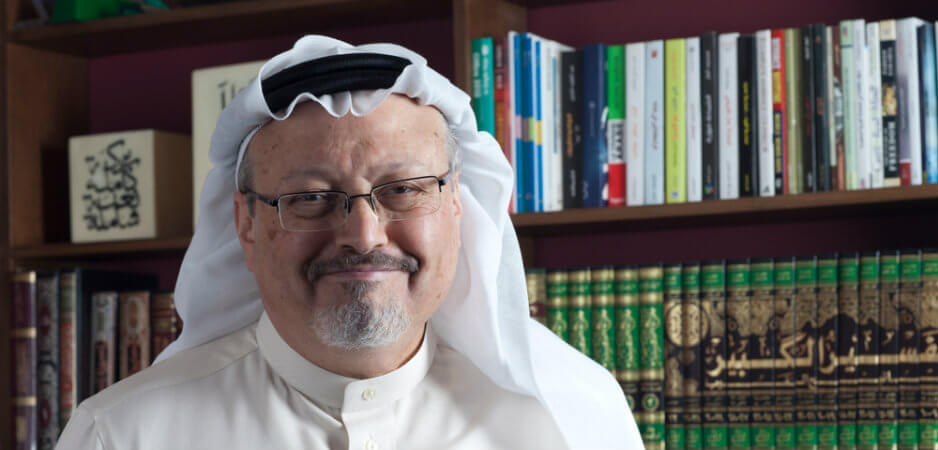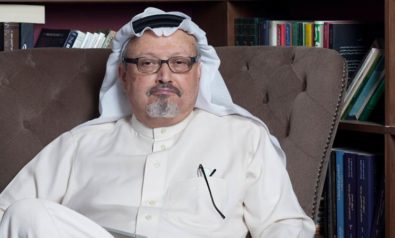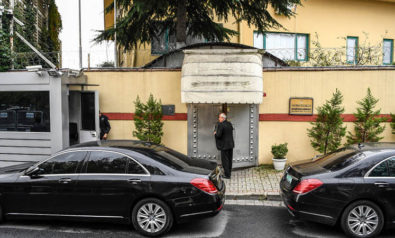We are at a very low point for journalism in the Gulf and the wider Middle East.
My thoughts are with Hatice Cengiz and Jamal Khashoggi’s family at this very painful time.
The job of journalists is to ask questions, to speak truth to power, to question authority. This has always been a very difficult struggle in the Gulf and wider Middle East, but this is what Jamal Khashoggi was committed to. He believed with great courage and passion that the way to achieve a better place for his country and society was to strive for an independent and free media. He was a pragmatist who understood well the limits of just how far he could push that narrative on, but he never, ever gave up pushing.
He was a brave and dedicated journalist and a warm and funny man.
The murder of Jamal Khashoggi does tremendous damage to the struggle to create a free and independent media in the Gulf and Arab worlds. It has already suffered so many grievous setbacks. To name but one, the Bahraini news site Al Wasat, the only truly independent voice in the Gulf, was shuttered by the authorities in the summer of 2017 with scarcely a murmur here in the West.
In 2011, Karim Fakhawi, Al Wasat’s co-founder, was beaten to death in detention by the police when he went to complain about his house being bulldozed. How quickly Karim’s fate was forgotten. In 2017 the UAE sentenced a Jordanian journalist Tayseer Al Najjar to three years in jail and a huge fine for “insulting the symbols of the state.” In January of this year, Lebanese journalist Hanin Ghaddar was sentenced in absentia by a military court for insulting the armed forces. How discouraging is that given the relative level of freedom the media enjoys in Lebanon?
Under the guise of security, open criticism and free media are being inexorably crushed. A friend of mine in the region said it is as if the walls are closing in: “We cannot breathe.” It has become a grim narrative arc, one that began with modest gains and hope for a freer media environment in the early part of this century but — especially after 2011 and the events of what has been called the Arab Spring — spirals downward to the appalling murder of Jamal Khashoggi.
It is telling that a chief demand of the Saudis and the Emiratis when they launched their land, air and sea blockade of Qatar last June, joined by the Egyptians and the Bahrainis, was the shuttering of Al Jazeera. The news network is not without its faults, but thank goodness that Qatar has withstood the siege — even Saudi Crown Prince Mohammed bin Salman, or MBS, has had to acknowledge that — and Al Jazeera remains safe.
Nonetheless, we are at a very low point for journalism in the Gulf and the wider Middle East. In my nearly 20 years of covering the region, I can think of no time when the struggle for free media has been so grievously wounded and so seriously set back.
The killing of Jamal Khashoggi — especially if the man I and many others believe is responsible for his death, MBS — is allowed to get away with it, as I fear now seems the case, his killing will only empower further atrocities and reprisals. The tame media will reflect the views and attitudes of the ruling families. Those journalists who want to ask questions dare not.
And silence will not be an option. Those who stay silent because they cannot stomach parroting lies will be seen as traitors or, as the president of the United States calls honest journalists, “enemies of the people.” In Saudi Arabia, the UAE and Bahrain the media are the slaves of their masters. It is a new form of Stalinism — Gulf Stalinism — whereby the media become the mouthpiece of the rulers.
For the sake of my murdered colleague, I do not want to end on a note of pessimism, because to do so would be to acknowledge his death was in vain. It was not. What he believed in, what he stood for and wrote about, and what he died for is the way forward. The Gulf and its citizens and those throughout the Middle East will only realize their full potential in a society where a free media flourishes. That is what Jamal passionately believed. And he was right. Jamal is a martyr to that noble cause.
Dictators and their lies do not endure. Speaking truth to power, even with all the terrible consequences it entails for journalists, ultimately brings their lies crashing down around them.
Thank you, Jamal, for your great and courageous journalism, your dedication, your commitment, your humor and your kindness. Know that you will not be forgotten, and that your death is not in vain. In your name the cause of free media in the Gulf and wider Middle East will carry on. Its victory will be your lasting legacy.
The views expressed in this article are the author’s own and do not necessarily reflect Fair Observer’s editorial policy.
Support Fair Observer
We rely on your support for our independence, diversity and quality.
For more than 10 years, Fair Observer has been free, fair and independent. No billionaire owns us, no advertisers control us. We are a reader-supported nonprofit. Unlike many other publications, we keep our content free for readers regardless of where they live or whether they can afford to pay. We have no paywalls and no ads.
In the post-truth era of fake news, echo chambers and filter bubbles, we publish a plurality of perspectives from around the world. Anyone can publish with us, but everyone goes through a rigorous editorial process. So, you get fact-checked, well-reasoned content instead of noise.
We publish 2,500+ voices from 90+ countries. We also conduct education and training programs
on subjects ranging from digital media and journalism to writing and critical thinking. This
doesn’t come cheap. Servers, editors, trainers and web developers cost
money.
Please consider supporting us on a regular basis as a recurring donor or a
sustaining member.
Will you support FO’s journalism?
We rely on your support for our independence, diversity and quality.

















